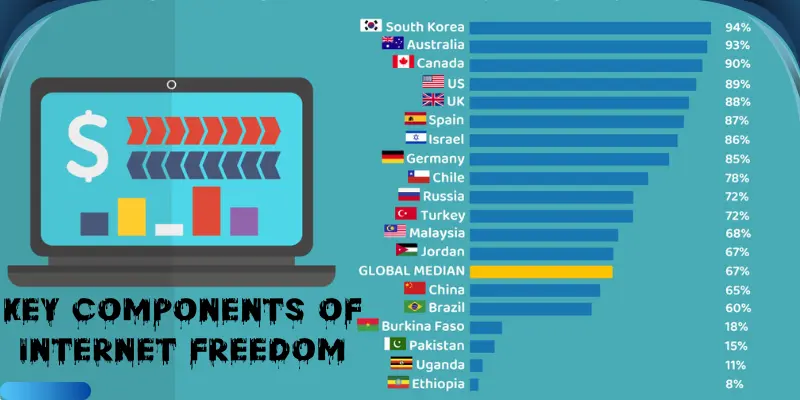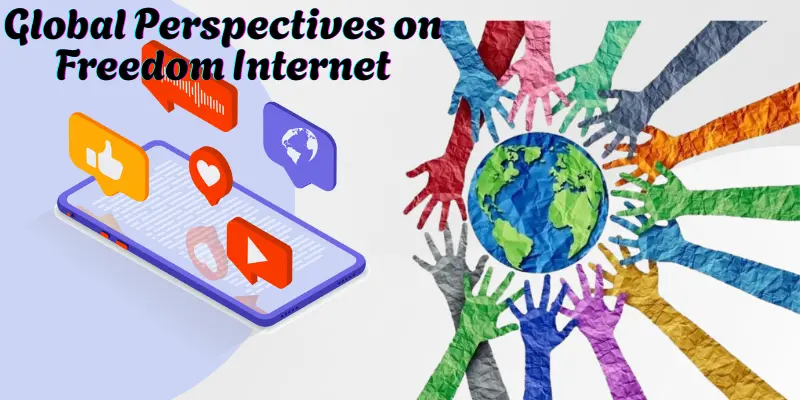Freedom Internet – The Importance, Challenges and Future
Published: 25/04/2025
Freedom Internet means having the power to use the internet without fear. People can speak, share, learn, and connect with others freely. It allows us to search for news, talk with friends, or study online without being stopped or watched. When internet freedom is strong, we can use websites, apps, and information from anywhere in the world. But when this freedom is taken away, our voices are silenced, and our choices are blocked. That’s why freedom internet is important for everyone it helps us live, learn, and grow in the digital world.
Table of Contents
Key Components of Internet Freedom
Internet Freedom is built on key parts that protect our rights, voices, and access online.

- Freedom of Expression
- People can share their thoughts, opinions, and ideas online without fear of being punished or blocked.
- Access to Information
- Everyone can open websites, watch videos, and read news from anywhere in the world without limits.
- Online Privacy and Safety
- Personal data stays private. No one can spy or track users without permission.
- No Internet Censorship
- Governments or companies do not block websites or control what people can see or do online.
- Equal Internet for All (Net Neutrality)
- All websites and apps work the same for everyone no one gets faster or slower internet because of money or power.
- Freedom to Use Tools and Platforms
- People can choose any browser, app, or website they like without being forced to use just one.
Challenges to Freedom Internet
Despite its importance, Freedom Internet faces numerous challenges that threaten open access, privacy, and free expression online.
- Government Censorship
- In many countries, governments block or filter websites, limiting access to information and ideas.
- Surveillance and Privacy Invasion
- Governments or companies may track online activity, collecting personal data without consent.
- Internet Shutdowns
- Some governments cut off access to the internet during protests or elections to control information flow.
- Laws and Regulations Limiting Speech
- Strict laws can punish individuals for sharing opinions or information, reducing freedom of expression.
- Corporate Control Over Content
- Big companies might prioritize their own interests, limiting access to certain content or services.
- Unequal Internet Access
- Not everyone has equal access to fast or affordable internet, leaving some people behind in the digital world.
- Cybersecurity Threats
- Hackers and cyberattacks can undermine trust in online platforms, making it hard for users to feel safe and secure.
Global Perspectives on Freedom Internet
Internet freedom is viewed differently around the world, with each country facing unique challenges and opportunities in balancing access, privacy, and regulation.

1. Varied Freedom Levels Across Countries
- Internet freedom varies widely between nations, with some enjoying full access, while others face strict censorship or surveillance.
2. China’s Strict Control
- In China, the government exercises extensive control over the internet, limiting access to foreign websites and closely monitoring online activity.
3. The United States: A Balancing Act
- While the U.S. generally supports internet freedom, issues like net neutrality debates and surveillance practices challenge the true extent of online liberty.
4. India’s Struggle with Censorship
- In India, the growing trend of internet censorship and shutdowns in times of political unrest has sparked debates about the balance between security and freedom.
5. Europe’s Regulation and Privacy Laws
- Europe places a strong emphasis on user privacy and data protection, with laws like the GDPR ensuring a more controlled and secure internet experience.
6. Global Efforts to Safeguard Online Freedom
- International organizations like Freedom House advocate for a free and open internet, pushing for global standards that protect privacy, security, and freedom of expression.
7. Russia’s Increasing Internet Restrictions
- Russia has tightened its grip on the internet, with measures like the “sovereign internet” law giving the government more control over online content and communications.
8. The Fight for Net Neutrality
- Around the world, there is ongoing debate about net neutrality the principle that internet service providers should treat all data on the internet equally, without discrimination or charging differently.
How to Protect Your Freedom Internet
Protecting your internet freedom requires a combination of smart practices, tools, and awareness to safeguard your privacy and unrestricted access online.
- Use Strong Passwords and Two-Factor Authentication
- Protect your online accounts from unauthorized access by using complex passwords and enabling two-factor authentication for an added layer of security.
- Utilize Virtual Private Networks (VPNs)
- A VPN helps mask your online activity, making it harder for third parties to track your browsing habits and access your private data.
- Be Mindful of Privacy Settings
- Regularly review and adjust privacy settings on social media and websites to limit who can see your personal information and activities.
- Avoid Using Public Wi-Fi for Sensitive Tasks
- Public Wi-Fi networks are often not secure, so avoid logging into accounts or making transactions over them to prevent hackers from accessing your data.
- Stay Informed About Censorship and Surveillance
- Educate yourself on the laws and regulations regarding internet freedom in your country, so you can take steps to protect your online activities.
- Use Encrypted Communication Tools
- When sending sensitive information, choose encrypted messaging apps and email services that ensure your data stays private.
- Support Policies That Promote Internet Freedom
- Advocate for net neutrality, privacy protection laws, and regulations that prevent government or corporate overreach into online spaces.
- Secure Your Devices and Internet Connection
- Install antivirus software, keep your devices up-to-date, and use firewalls to prevent unauthorized access to your personal data.
The Future of Freedom Internet
The future of internet freedom will depend on how governments, corporations, and individuals balance security, privacy, and open access in an increasingly connected world.

- Increased Global Regulation
- As more countries adopt internet governance rules, we may see more unified global efforts to protect online rights while balancing security.
- Stronger Privacy Protections
- The growing demand for data privacy will likely lead to stricter laws, ensuring better protection for individuals’ personal information online.
- Rise of Decentralized Networks
- Decentralized internet systems could challenge current centralized models, giving users more control over their online presence and data.
- Advocacy for Digital Rights
- Activists and organizations will continue to fight for net neutrality, free expression, and anti-censorship policies to maintain open and fair online spaces.
- AI and Automation’s Role in Security
- The future of internet freedom will also be shaped by AI tools that help protect online activities, predict threats, and ensure safe browsing.
- Focus on Secure Communications
- Encrypted communication will become the standard, with more platforms offering secure ways for individuals to connect without fear of surveillance.
- Access for All
- Efforts will continue to expand internet access globally, with a focus on bridging the digital divide in underserved and rural areas.
Advantages and Disadvantages of Freedom Internet
Freedom Internet brings both powerful benefits and serious concerns that shape how we connect, express, and stay secure online.
Benefits of Freedom Internet
Freedom Internet empowers users with open access, unrestricted communication, and limitless opportunities for knowledge and growth.
| Pros of Freedom Internet |
|---|
|
Drawbacks of Freedom Internet
While internet freedom offers many benefits, it can also open the door to risks like misinformation, cybercrime, and lack of content control.
| Cons of Freedom Internet |
|---|
|
Common FAQs about Freedom Internet
People often have important questions about how Freedom Internet works and what it means for their online rights.
Internet freedom refers to the ability of individuals to access, use, and share information online without government or corporate restrictions, censorship, or surveillance.
It supports the exchange of ideas, democratic participation, and innovation, enabling free expression and access to diverse viewpoints.
Restricting internet freedom can lead to the suppression of free speech, limited access to information, and hinder innovation and progress.
Governments can enact laws that protect privacy, prevent censorship, and promote net neutrality, ensuring the internet remains open and accessible.
Corporations have a responsibility to protect users’ data, avoid censorship, and promote transparency in their operations while respecting digital rights.
It facilitates communication across borders, making it easier for individuals, organizations, and governments to connect and collaborate on a global scale.
Conclusion
In the rapidly evolving digital age, safeguarding internet freedom is essential for maintaining open communication, innovation, and individual rights. While there are undeniable challenges like cybersecurity threats and misinformation, the future of the internet hinges on finding a balance between freedom and responsibility. By advocating for privacy protection, net neutrality, and free speech, we can ensure a safer and more equitable online world for all.

- Be Respectful
- Stay Relevant
- Stay Positive
- True Feedback
- Encourage Discussion
- Avoid Spamming
- No Fake News
- Don't Copy-Paste
- No Personal Attacks

- Be Respectful
- Stay Relevant
- Stay Positive
- True Feedback
- Encourage Discussion
- Avoid Spamming
- No Fake News
- Don't Copy-Paste
- No Personal Attacks





